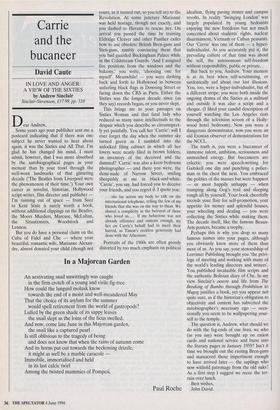Carrie and the bucaneer
David Caute
IN LOVE AND ANGER: A VIEW OF THE SIXTIES by Andrew Sinclair Sinclair-Stevenson, £17.99, pp. 310 Dear Andrew, Some years ago your publisher sent me a postcard indicating that if there was one subject he never wanted to hear about again, it was the Sixties and All That. I'm glad he has changed his mind. I must admit, however, that I was more absorbed by the autobiographical pages in your memoir than by your trawl through the well-worn landmarks of that glittering decade (`The Beatles from Liverpool were the phenomenon of their time.') Your own career as novelist, historian, Hollywood script-writer, film director and publisher I'm running out of space — from Suez to Kent State is surely worth a book, without additional clippings on the Beatles, the Moors Murders, Marcuse, McLuhan, the Situationists, Woodstock and Lennon.
But you do have a personal claim on the Cuba of Fidel and Che — where your beautiful, romantic wife, Marianne Alexan- dre, almost donated your child (though not yours, as it turned out, so you tell us) to the Revolution. At some juncture Marianne was held hostage, though not exactly, and you dashed to Havana to rescue her. On arrival you passed the time by training Eldridge Cleaver and other Panther exiles how to use obsolete British Bren-guns and Sten-guns, nimbly convincing them that you had guarded Buckingham Palace while in the Coldstream Guards. 'And I assigned fire positions from the windows and the balcony,' you write, 'choosing one for myself. Meanwhile! — you were dashing back and forth to Hollywood in between unfurling black flags in Downing Street or facing down the CRS in Paris. Either the Sixties was the longest decade since (as they say) records began, or you never slept.
This brings me to your passages on Sixties Woman and that fatal lady who reduced so many naive intellectuals to the despair which you describe so circumspect- ly yet painfully. You call her 'Carrie': will I ever forget the day when the summer sky turned green as I tumbled into the unlocked filing cabinet in which all her lovers were neatly filed in brown folders, an inventory of the deceived and the damned? 'Carrie' was also a keen bedroom photographer — and there you were, the demi-nude of Narrow Street, smiling sheepishly at me in black-and-white. `Carrie', you say, had forced you to deceive your friends, and you regret if. I quote you: ... she lay across my body to talk on the international telephone, telling the few of my friends that she was on the way to them. We shared a complicity in the betrayal of those who loved us. . . If my behaviour was not already offensive and ruinous enough, my lies on Carrie's behalf had to merit their hatred, as Timon's reckless generosity had done with the Athenians.
Portraits of the 1960s are often grossly distorted by too much emphasis on political idealism, flying paving stones and campus revolts. In reality 'Swinging London' was largely populated by young hedonists enjoying the new freedoms but not much concerned about students' rights, nuclear disarmament, Vietnam or Cuban peasants. Our 'Carrie' was one of them — a hyper- individualist. As you accurately put it, the prevailing culture of that time was about the self, the autonomous self-freedom without responsibility, public or private.
But back to you, Andrew. Your memoir is at its best when self-scrutinising, or sardonically sad about our lost illusions. You, too, were a hyper-individualist, but of a different stripe: you were both inside the ongoing drama of the Sixties as a militant and outside it was also a script and a cheque. (I liked your candid description of yourself watching the Los Angeles riots through the television screen of a Holly- wood hotel bedroom). Now you were a dangerous demonstrator, now you were an old Etonian observer of demonstrations for the NCCL.
The truth is, you were a buccaneer of immense talent, ambition, seriousness and unmatched energy. But buccaneers are eclectic: you were speech-writing for Gaitskell one day and punching a police- man in the chest the next. You embraced the politics of the masses but were happiest — or most happily unhappy — when tramping along Gog's trail and sleeping rough all by yourself. Your book cheerfully records your flair for self-promotion, your appetite for money and splendid houses, your wheeling and dealing — you were collecting the Sixties while making them. The decade itself, like the famous Beaux- Arts posters, became a trophy.
Perhaps this is why you drop so many famous names into your pages, although you obviously knew more of them than most of us. As you say, your stewardship of Lorrimer Publishing brought you 'the privi- lege of meeting and working with many of the world's leading directors and writers'. You published invaluable film scripts and the authentic Bolivian diary of Che. In my view Sinclair's oeuvre and life from The Breaking of Bumbo through Prohibition to Magog justifies a book, yet you appear not quite sure, as if the historian's obligation to objectivity and context has subverted the autobiographer's necessary ego — occa- sionally you seem to be wallpapering your- self to the temple.
The question is, Andrew, what should we do with the fag-ends of our lives, we who (as you say) were brought up on ration cards and national service and burst into the literary pages in January 1959? Isn't it time we brought out the rusting Bren-guns and massacred those impertinent enough to have arrived later — the saplings who now withold patronage from the old oaks? As a first step I suggest we recce the ter- rain over lunch.
Best wishes, John David.


























































 Previous page
Previous page